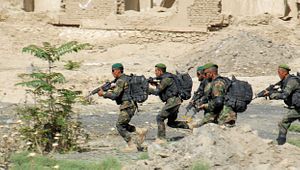Reports emerged Thursday that Afghan forces had successfully captured the son of the founder of the Haqqani network earlier this week. Anas Haqqani, the group’s second in command after Jalaluddin Haqqani, was captured on Tuesday in the eastern Afghan city of Khost. Hafiz Rashid, a commander for the terror network in southeastern Afghanistan, was also captured on Tuesday.
Capturing Haqqani represents a coup for Afghanistan’s security forces who have come under scrutiny this year as the United States and NATO prepare to withdraw a majority of their troops from Afghanistan. The Haqqani network, though mainly based in Pakistan, has taken responsibility for several attacks on international and Afghan troops. The arrests also come shortly after reports emerged that key Taliban commander Mullah Abdul Rahman Maldar was killed in Herat. According to the Wall Street Journal, one Afghan security official describes Haqqani’s capture as “a huge deal.”
According to Reuters, Haqqani was the group’s primary fund raiser. The Afghan National Directorate for Security (NDS) noted that Haqqani mostly focused his fund raising efforts on “individuals from Arab countries.” He additionally directed the group’s social media recruitment efforts. With Haqqani out of the picture, the network’s ability to successfully grow and fund its activities may be hindered. Rashid was in charge of “selecting targets and providing equipment for suicide bombers in Kabul,” according to Reuters. Afghan officials further cite Rashid as the central planner of the group’s suicide attacks.
“We hope that these two arrests will have direct consequences on the network and their centre of command,” NDS spokesman Haseeb Sediqi noted.
The Haqqani network is currently thought to be operated by Sirajuddin Haqqani, Anas Haqqani’s brother. Their father, Jalaluddin Haqqani, is reportedly in poor health. The Afghan NDS provided few details about the circumstances of the arrest. Emphasizing the importance of Anas’ arrest, one Afghan security official told the WSJ that “operationally, he was the second in the leadership rank. If Sirajuddin had been killed, he was going to take over immediately.”
The network has attacked a variety of foreign targets in Afghanistan in the past including various hotels, the U.S. embassy, NATO supply convoys, and the Indian embassy. U.S. officials believe that the group operates out of Pakistan’s Waziristan tribal region, which borders Afghanistan. The United States has established a special unit based in Afghanistan to counter the group’s planned attacks, Reuters reports.

































